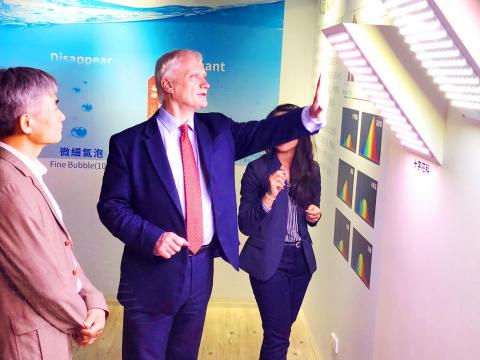British Undersecretary of State for International Trade Graham Stuart yesterday set an optimistic tone for the possibility of a trade agreement between Taiwan and the UK after Brexit, touting the productive environment created by bilateral trade talks.
Stuart made the remarks at a news conference in Taoyuan at the vertical vegetable farming company YesHealth iFarm (源鮮智慧農場), which is to invest £18 million (US$25.5 million) to establish its first European base with a vertical farming factory in York, England.
“This is only the latest announcement in a pattern of mutual trade and investment that has flourished between our economies in recent years,” Stuart said, adding that the firm’s 14-story vertical farm is Asia’s largest indoor plant producer and is at the cutting edge of an industry that, while still in its early stages, has truly global implications.

Photo: Lu Yi-hsuan, Taipei Times
He also announced that frozen food manufacturer Han Dian Frozen Prepared Food Co (漢典食品) would invest £3.5 million to expand its UK manufacturing operation, following an initial investment in London in September last year.
Asked about the possibility of a trade deal between Taipei and London, Stuart said that the British government has had excellent trade talks with Taiwan and that they have been very productive since they were established.
“As we leave the EU, the first step is to roll over existing agreements, which countries around the world have so far indicated that they are happy to do,” Stuart said, adding that the UK’s next step would be looking to work closely with its allies around the world.
“For now, the trade talks between Taiwan and the UK provide a very productive environment to develop further links between the two countries,” he said, without elaborating.
The two nations, which saw two-way trade of £5.4 billion in 2016, concluded their 20th round of trade talks in London in December last year, where they reached a consensus to set up a dialogue platform this year to discuss agriculture and energy cooperation.
President Tsai Ing-wen (蔡英文) said in a meeting with Stuart at the Presidential Office on Monday that the two nations have been given a chance to upgrade the overall bilateral relationship, as the UK is preparing to form new trade relationships with important trading partners in the post-Brexit era.
In addition to agriculture and “green” energy, there are other key areas where Taiwan and the UK have mutual interests and cooperation, including biotech, artificial intelligence, infrastructure and railways, Stuart said.
“England was the first country in the world to develop civil nuclear power. We have tremendous experience in dealing with the end of life of nuclear plants. So there is a huge opportunity for British firms to support Taiwan in ... dealing with its nuclear legacies and developing ‘green’ renewables,” Stuart said.

SECURITY: As China is ‘reshaping’ Hong Kong’s population, Taiwan must raise the eligibility threshold for applications from Hong Kongers, Chiu Chui-cheng said When Hong Kong and Macau citizens apply for residency in Taiwan, it would be under a new category that includes a “national security observation period,” Mainland Affairs Council (MAC) Minister Chiu Chui-cheng (邱垂正) said yesterday. President William Lai (賴清德) on March 13 announced 17 strategies to counter China’s aggression toward Taiwan, including incorporating national security considerations into the review process for residency applications from Hong Kong and Macau citizens. The situation in Hong Kong is constantly changing, Chiu said to media yesterday on the sidelines of the Taipei Technology Run hosted by the Taipei Neihu Technology Park Development Association. With

CARROT AND STICK: While unrelenting in its military threats, China attracted nearly 40,000 Taiwanese to over 400 business events last year Nearly 40,000 Taiwanese last year joined industry events in China, such as conferences and trade fairs, supported by the Chinese government, a study showed yesterday, as Beijing ramps up a charm offensive toward Taipei alongside military pressure. China has long taken a carrot-and-stick approach to Taiwan, threatening it with the prospect of military action while reaching out to those it believes are amenable to Beijing’s point of view. Taiwanese security officials are wary of what they see as Beijing’s influence campaigns to sway public opinion after Taipei and Beijing gradually resumed travel links halted by the COVID-19 pandemic, but the scale of

A US Marine Corps regiment equipped with Naval Strike Missiles (NSM) is set to participate in the upcoming Balikatan 25 exercise in the Luzon Strait, marking the system’s first-ever deployment in the Philippines. US and Philippine officials have separately confirmed that the Navy Marine Expeditionary Ship Interdiction System (NMESIS) — the mobile launch platform for the Naval Strike Missile — would take part in the joint exercise. The missiles are being deployed to “a strategic first island chain chokepoint” in the waters between Taiwan proper and the Philippines, US-based Naval News reported. “The Luzon Strait and Bashi Channel represent a critical access

Pope Francis is be laid to rest on Saturday after lying in state for three days in St Peter’s Basilica, where the faithful are expected to flock to pay their respects to history’s first Latin American pontiff. The cardinals met yesterday in the Vatican’s synod hall to chart the next steps before a conclave begins to choose Francis’ successor, as condolences poured in from around the world. According to current norms, the conclave must begin between May 5 and 10. The cardinals set the funeral for Saturday at 10am in St Peter’s Square, to be celebrated by the dean of the College